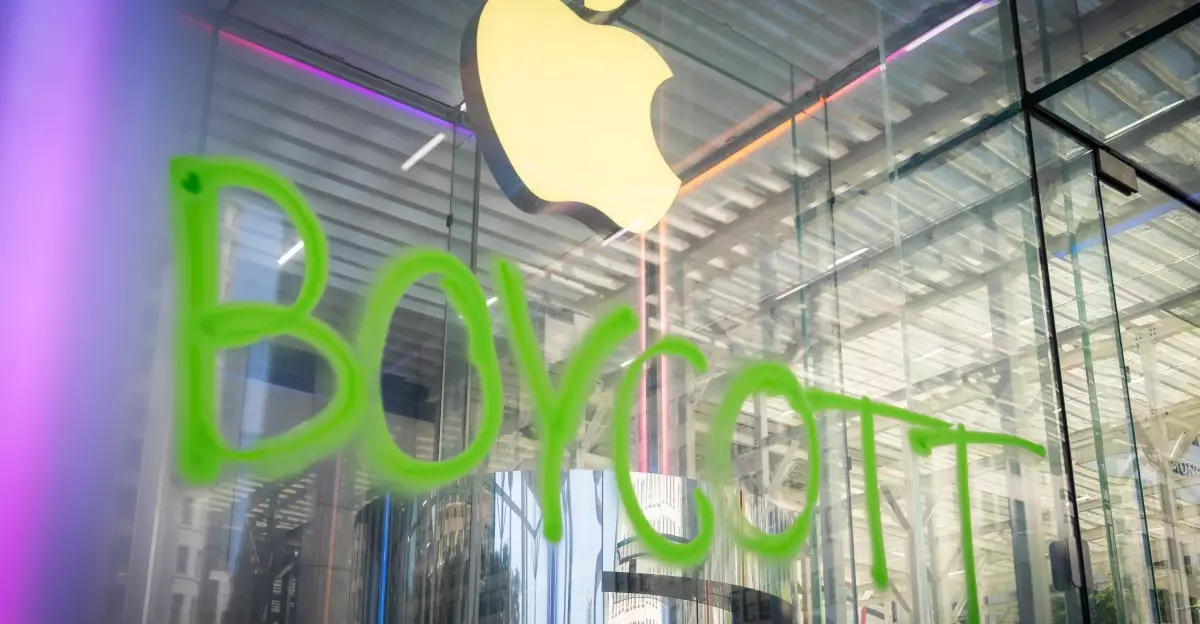In the age of climate crises and environmental urgency, corporations like Apple, Google, and Microsoft have positioned themselves as champions of sustainability. Yet, beneath their sleek marketing campaigns and glowing sustainability reports lies a stark disconnect. Their vocal claims about climate responsibility often crumble under scrutiny, revealing a pattern of superficiality and hypocrisy. The recent protest at Apple’s New York City flagship underscores this dissonance. Activists from Extinction Rebellion highlighted how, despite public declarations supporting the Paris Agreement, these tech giants continue to fund and support policies and administrations that undermine environmental progress—most notably, the Trump administration’s rollback of climate regulations and fuel subsidies. This contradiction exposes a troubling trend where corporate virtue signals serve more as shield and branding than as genuine commitment.
The Myth of Tech’s Environmental Leadership
The narrative that big tech companies are at the forefront of fighting climate change is fundamentally flawed. Their massive energy consumption, particularly in data centers and AI development, paints a different picture. Google’s rising emissions, Microsoft’s increased energy demands as it pushes further into AI, and similar indicators from other tech giants paint a sobering reality: the growth of digital infrastructure is accelerating environmental degradation rather than mitigating it. These companies often chase the allure of technological innovation, but their progress is undermined by their environmental costs. The protests calling out Apple’s support for a Trump administration that diminishes climate protections serve as a stark reminder that corporate rhetoric often fails to translate into meaningful action.
The Power Dynamics and Ethical Failings
What is most disconcerting is the complicity of corporate leaders like Tim Cook, Sundar Pichai, and Mark Zuckerberg in supporting administrations that actively dismantle environmental policies. Despite their claims of championing sustainability, their political and financial support for policies favoring fossil fuels and climate denial paints a different picture. The recent spray-painting protest, with slogans like “Tim + Trump = Toxic,” exemplifies how activists perceive industry leaders as contributing to environmental destruction through their political alignments and business decisions. Apple, which touts its environmental initiatives, continues to support and operate within a political framework that jeopardizes future generations’ ability to thrive.
The Call for Authentic Climate Leadership
Activists are rightly demanding more than empty slogans—what they seek is authentic leadership rooted in tangible actions, transparency, and accountability. The contradictions of claiming to “support climate action” while backing policies and administrations that do the opposite reveal a failure not only of corporate governance but of societal expectations. True climate leadership requires standing firm against political and economic interests that threaten to erase decades of progress. It also involves rethinking priorities—moving away from energy-intensive AI pursuits that exacerbate emissions—and focusing on sustainable innovations that genuinely benefit the planet. The protests serve to awaken consumers and stakeholders alike, urging them to scrutinize corporate claims and push for real change instead of mere green marketing.
Beyond the Surface: The Need for Systemic Change
Addressing the climate crisis demands systemic change far beyond individual corporate actions or protests. While public pressure is crucial, it must accompany a reevaluation of how economic growth is defined and pursued. Relying on dubious corporate narratives without confronting structural issues allows environmental degradation to continue masked behind feel-good campaigns. A holistic approach involves holding governments accountable, transforming energy policies, and demanding corporations overhaul their supply chains, business models, and political engagements. For consumers and activists, the challenge is to resist the allure of superficial sustainability and demand genuine commitments that prioritize climate justice over profit and image.
The protest at Apple’s store was more than an act of defiance; it was a stark reminder that the real fight against climate change involves confronting powerful interests that profit from environmental destruction. To make meaningful progress, society must look beyond surface-level corporate narratives and push for authentic, systemic change that aligns actions with words. Only then can the true spirit of environmental activism—focused on justice, sustainability, and accountability—prevail over the facade of greenwashed corporate virtue.

